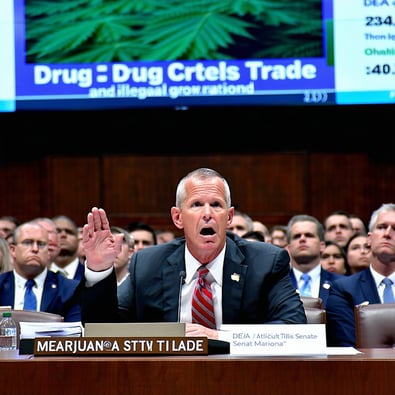As cannabis rescheduling inches forward, the conversation surrounding its impact on traditional banking and capital markets has intensified.
Pablo Zuanic, an equity analyst covering cannabis and psychedelics, shared his thoughts during a recent interview, shedding light on what rescheduling could mean for the industry's financial future. Zuanic, who will speak at the upcoming Benzinga Cannabis Capital Conference, believes that while rescheduling holds promise, its timeline and impact remain uncertain.
A Long-Awaited Move
Zuanic explained that the Biden administration is committed to cannabis rescheduling, a process that began in October 2022. However, completing the process is proving to be complex. "Rescheduling is something that President Biden wanted to get done expeditiously in his term but done in a deliberate, systematic way, following the rules of the Controlled Substances Act," he said. While the timeline is uncertain, many are closely watching for developments that could come before the 2024 election.
However, as Zuanic pointed out, there's a possibility the process might extend beyond the current administration. "All scenarios are on the table," he said, suggesting that while a final ruling could arrive before the election, it's equally possible it may be delayed. Zuanic believes that should Vice President Kamala Harris win the election, she would likely continue the rescheduling process into her first term.
The Banking and Capital Markets Question
One of the most pressing concerns regarding rescheduling is how it will affect cannabis businesses' access to traditional banking services and capital markets. Currently, most cannabis companies are unable to access these services due to the plant's classification under federal law.
Zuanic noted that the completion of rescheduling could be accompanied by additional guidance from the Department of Justice. "Yes, there will be some form of accompanying memorandum at some point that would make it easier for banks to operate in the industry and for U.S. exchanges to uplift [cannabis stocks]," he said.
The uncertainty lies in how comprehensive the rescheduling process will be. Zuanic acknowledged that the industry could see some progress if a memo from the DOJ clarifies how federal agencies will treat cannabis-related businesses. He also mentioned the potential for the long-discussed Safe Banking Act to pass as part of other legislation. "There's still the possibility that Safe Banking can get done attached to a crypto bill," he said.
A Delicate Balance
While rescheduling offers hope for progress, Zuanic stressed that it's a careful balancing act. The administration must ensure the process is thorough enough to withstand legal challenges. "If they rush it in the lame-duck, they could make it even more susceptible to legal challenges or even a CRA review," he explained. This caution is necessary to avoid setbacks that could further delay much-needed reforms.
With federal rescheduling on the horizon, the cannabis industry remains hopeful for more accessible banking and capital market opportunities. As Pablo Zuanic prepares to share his insights at the Benzinga Cannabis Capital Conference, many in the industry will be paying close attention to the future of cannabis financial services in the U.S.
For more Cannabis News like this, circle back to 420intel.com!
420 Intel News | 420 Advertising | Cannabis Business News | Medical Marijuana News | Recreational Marijuana News





